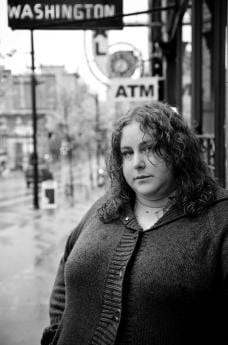An Ontario Superior Court judge has struck down Canada’s controversial prostitution laws, saying they endanger the people they purport to protect.
The Sept 28 decision, which so far only affects Ontario, is being hailed as a victory by sex workers and their allies across the country.
A similar case is awaiting decision in BC.
Both the Ontario and BC plaintiffs are hopeful today’s ruling will signal the beginning of a national end to the Criminal Code prohibitions on keeping a common bawdyhouse, communicating for the purposes of prostitution and living on the avails of prostitution. That, however, depends on the Ontario decision being upheld in the Supreme Court of Canada.
In a constitutional challenge brought last year, Valerie Scott, Terri-Jean Bedford and Amy Lebovitch argued that the prohibitions force sex workers out of the safety of their homes and workplaces to face violence on the streets.
Justice Susan Himel agreed.
“I find that the danger faced by prostitutes greatly outweighs any harm which may be faced by the public,” Himel wrote in her 131-page ruling, The Globe and Mail reported.
Bedford, Scott and lawyer Alan Young were clearly surprised by the decision, which comes with a freeze of 30 days before taking effect. “This is one of the first times in the last 25 years that rationality has triumphed over hypocrisy,” said Young. “Justice Himel proved that after 25 years, the Charter still has teeth.”
The biggest change is that Ontario sex workers will be free to work indoors and in groups, without triggering Canada’s bawdyhouse laws, says Young. It also means hookers will be able to hire drivers, bouncers and bodyguards to keep themselves safer.
It remains to be seen if the ruling protects the country’s bathhouses, which have also suffered police harassment, usually using the periodic enforcement of the bawdyhouse law.
“The court has finally heard what sex workers and their allies have been screaming about for years,” says Susan Davis of BC’s Coalition for Experiential Communities. “These laws have placed sex workers outside society’s sphere of concern. This is a historic day.”
With the BC Court of Appeal case awaiting its own decision, lawyer Katrina Pacey of Vancouver’s PIVOT Legal Society is hopeful that case too will strike down the laws for BC. “They were found to be unconstitutional,” she says.
Pacey explains that courts can only influence laws in their own jurisdiction. She expects the Ontario case to go to Ontario’s appeal court and then to the Supreme Court of Canada, a process that could take up to two years.
Ontario Ministry of the Attorney-General spokesperson Brendan Crawley says the government is reviewing the decision. The government intervened on the side of the federal government in opposing the challenge.
Federal Justice Minister Rob Nicholson says the Harper government is “very concerned about the Superior Court’s decision and is seriously considering an appeal.”
“The Government of Canada is committed to the health and safety of all Canadians and the well-being of our communities. We will fight to ensure that the criminal law continues to address the significant harms that flow from prostitution to both communities and the prostitutes themselves, along with other vulnerable persons,” Nicholson said in a statement.
That didn’t stop members of Vancouver’s sex-trade community from celebrating. “This is a historic moment as regards the rights of sex workers,” says Esther Shannon of Feminists Advocating for the Decriminalization of Sex Work.
Davis called on BC and Vancouver officials to stop enforcing the laws.
“We should no longer fear the police,” she says. “We need to identify predators who have been plaguing us for years.
“I can’t help but think of the sex workers who aren’t here with us,” she adds, her voice breaking.
Justice Himel says it is now up to Parliament to fashion new laws.
However, in what could be a preemptive move anticipating the Ontario decision, Conservative MP Joy Smith has recommended that Canada criminalize the buying of sex in a manner modelled on Sweden’s prostitution laws. Calling it a move to combat human smuggling, Smith wants to make buying sex illegal.
With files from Marcus McCann.

 Why you can trust Xtra
Why you can trust Xtra


